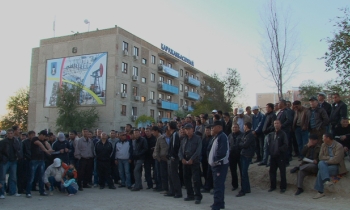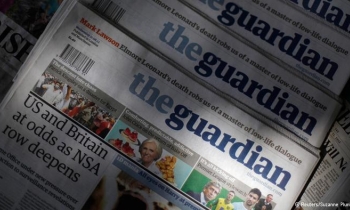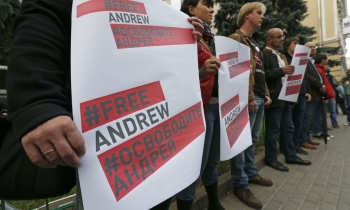NEW YORK A Syrian journalist often used as a fixer for Western news outlets has taken responsibility for a Cox News Service story that contained fabricated quotes and plagiarized material.
George Baghdadi, a Syrian who has worked for USA Today and Time magazine, among other Western news outlets, took responsibility for the errors in an e-mail to Cox Newspapers' Washington Bureau Chief Andy Alexander, but blamed their origin on an assistant.
The story, which was written by longtime Cox contract reporter Craig Nelson, moved on the New York Times News Service Nov. 20 and appeared in several papers around the country. At least two papers have run corrections noting the errors, but several others have been slow to correct the original Web version of the story.
Reported from Damascus, Syria, the article examined the popularity of an Arab version of the classic Barbie doll. Similar articles written by the St. Petersburg (Fla.) Times' senior foreign correspondent Susan Taylor Martin ran in January and May. Editors at the Times alerted Cox to the similarities on Nov. 22 and Cox immediately launched an investigation into the matter.
Alexander, who spearheaded the inquiry, said that Nelson was unaware that material supplied by Baghdadi had been fabricated from the earlier Times stories.
Alexander said Nelson's unattributed use of Baghdadi's quotes did not conform to the company's policy on sourcing, but otherwise Nelson acted in good faith.
However, Alexander expressed doubt about Baghdadi's explanation of the events. In an e-mail Baghdadi sent to Alexander obtained by E&P, Baghdadi blames the mistakes on a 26-year-old assistant working for him named Hussein Ali.
Alexander said Baghdadi would not make Ali available to talk with Cox editors. "We would like to talk to him," Alexander said.
"Because of the reputation of George Baghdadi and the fact that he was used by many Western news organizations for years and years, we felt we were dealing with someone who was trustworthy," Alexander said. "We won't use him again."
Jim Booth, senior editor at the St. Petersburg Times, said he was satisfied with the response from Cox.
"They took it extremely seriously, they turned it around very quickly, and they gave me a very full explanation of how they thought it happened," he said. "It all made sense so we're satisfied about what we got from them."
Speaking from Jerusalem, Nelson said Wednesday afternoon that it is commonplace for foreign correspondents to use translators and fixers. Syria, where he reported the story, is a notoriously difficult place for Western journalists to work and Nelson said Baghdadi had been recommended by another foreign correspondent.
"I've been to Damascus once before in the spring and he'd worked with me then," Nelson said. "He was my fixer then. He translated interviews while I asked questions."
For the story in question, Nelson said he had to leave Damascus and he sent an e-mail to Baghdadi asking him to do one interview with one subject.
"He knew how to get on the phone and set up interviews with government agencies and human rights organizations," Nelson said. "He'd never done interviews for me. This is a single instance where I'd asked him to work for me."
Nelson said Baghdadi supplied the plagiarized quotes in less than 24 hours.
Nelson added that he knew Baghdadi had other journalists working for him, but said he does not recall ever meeting Ali.
One of the first sites to notice the correction was Regret the Error, a Web site that tracks newspaper corrections. Editor Craig Silverman noted on his blog that as of Tuesday, several of the Web sites that ran the plagiarized story had yet to run corrections, much less corrections on the article itself.
"It should still be said that not enough of an effort was made to remove the offending article and offer up an appropriate correction," Silverman argued. "This is an Editor's Note-level mistake. Yet the article is still available for reading on several websites."
The full correction that ran on the New York Times News Service Monday follows:
CORRECTION/APOLOGY TO NEW YORK TIMES NEWS SERVICE CLIENTS
A Correction and Apology
Editors:
A story slugged BURQA-BARBIE20-COX that moved on the New York Times News Service for use Sunday, Nov. 20, contained material that was fabricated and material that originally appeared in an article published earlier this year by the St. Petersburg Times. A Syrian-based journalist, who assisted in the reporting for the story, has taken responsibility for the suspect material and apologized.
Craig Nelson, a contract freelancer who has written for Cox Newspapers from the Middle East since 2001, wrote the story about a doll marketed in the Muslim world. While in Damascus, Nelson employed the services of Damascus-based Syrian journalist George Baghdadi to assist with research for the story.
Baghdadi, whose work has appeared in Time magazine and USA Today among other publications, was asked by Nelson to interview Syrians shopping for the popular doll called "Fulla" and provide quotes about the doll's appeal to consumers. Nelson included a submission from Baghdadi in his story, but failed to credit him, which is contrary to Cox Newspapers' sourcing policy.
After Nelson's story moved on the NYTNS wire and appeared in print, editors for the St. Petersburg Times noted similarities between certain quotes in the Nelson story and passages from a staff-written story published in May by the St. Petersburg Times. These disturbing similarities were brought to the attention of Cox editors last week.
An investigation by editors at Cox Newspapers revealed the following:
* Portions of the Nelson story reported by Nelson were not in question and showed no similarities to the St. Petersburg Times article.
* Nelson was unaware that the material supplied by Baghdadi for his story was suspect.
* Baghdadi admits that two people quoted in Nelson's story were fabricated and that their quotations were lifted in part from passages that appeared in the St. Petersburg Times.
* Baghdadi took responsibility for the fabrication and plagiarism, but said that he was not directly responsible for providing the material. He claims that one of his assistants, Hussein Ali, was responsible for the ethical lapses and has been fired. Baghdadi would not make Ali available to the editors of Cox Newspapers for questioning.
As a result of this unfortunate incident, Cox Newspapers apologizes to its readers, the clients of the NYTNS and, especially, to the St. Petersburg Times.
endit
Jay DeFoore (jdefoore@editorandpulisher.com) is E&P's Online Editor.









